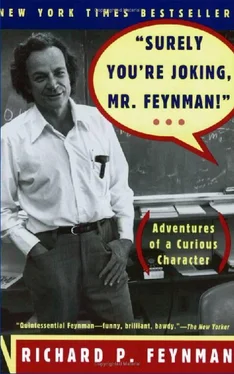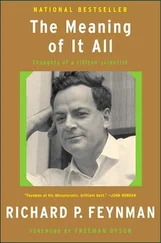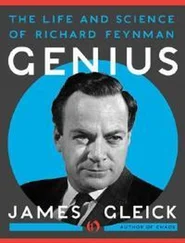He went out, and I began to think. Is there a way to make it go around faster? What if we did nothing else on the machine, so nothing else was interfering? I put a challenge to the boys on the blackboard—CAN WE DO IT? They all start yelling, “Yes, we’ll work double shifts, we’ll work overtime,” all this kind of thing. “We’ll try it. We’ll try it!”
And so the rule was: All other problems out. Only one problem and just concentrate on this one. So they started to work.
My wife, Arlene, was ill with tuberculosis—very ill indeed. It looked as if something might happen at any minute, so I arranged ahead of time with a friend of mine in the dormitory to borrow his car in an emergency so I could get to Albuquerque quickly. His name was Klaus Fuchs. He was the spy, and he used his automobile to take the atomic secrets away from Los Alamos down to Santa Fe. But nobody knew that.
The emergency arrived. I borrowed Fuchs’s car and picked up a couple of hitchhikers, in case something happened with the car on the way to Albuquerque. Sure enough, just as we were driving into Santa Fe, we got a flat tire. The two guys helped me change the tire, and just as we were leaving Santa Fe, another tire went flat. We pushed the car into a nearby gas station.
The gas station guy was repairing somebody else’s car, and it was going to take a while before he could help us. I didn’t even think to say anything, but the two hitchhikers went over to the gas station man and told him the situation. Soon we had a new tire (but no spare—tires were hard to get during the war).
About thirty miles outside Albuquerque a third tire went flat, so I left the car on the road and we hitchhiked the rest of the way. I phoned a garage to go out and get the car while I went to the hospital to see my wife.
Arlene died a few hours after I got there. A nurse came in to fill out the death certificate, and went out again. I spent a little more time with my wife. Then I looked at the clock I had given her seven years before, when she had first become sick with tuberculosis. It was something which in those days was very nice: a digital clock whose numbers would change by turning around mechanically. The clock was very delicate and often stopped for one reason or another—I had to repair it from time to time—but I kept it going for all those years. Now, it had stopped once more—at 9:22, the time on the death certificate!
I remembered the time I was in my fraternity house at MIT when the idea came into my head completely out of the blue that my grandmother was dead. Right after that there was a telephone call, just like that. It was for Pete Bernays—my grandmother wasn’t dead. So I remembered that, in case somebody told me a story that ended the other way. I figured that such things can sometimes happen by luck—after all, my grandmother was very old—although people might think they happened by some sort of supernatural phenomenon.
Arlene had kept this clock by her bedside all the time she was sick, and now it stopped the moment she died. I can understand how a person who half believes in the possibility of such things, and who hasn’t got a doubting mind—especially in a circumstance like that—doesn’t immediately try to figure out what happened, but instead explains that no one touched the clock, and there was no possibility of explanation by normal phenomena. The clock simply stopped. It would become a dramatic example of these fantastic phenomena.
I saw that the light in the room was low, and then I remembered that the nurse had picked up the clock and turned it toward the light to see the face better. That could easily have stopped it.
I went for a walk outside. Maybe I was fooling myself, but I was surprised how I didn’t feel what I thought people would expect to feel under the circumstances. I wasn’t delighted, but I didn’t feel terribly upset, perhaps because I had known for seven years that something like this was going to happen.
I didn’t know how I was going to face all my friends up at Los Alamos. I didn’t want people with long faces talking to me about it. When I got back (yet another tire went flat on the way), they asked me what happened.
“She’s dead. And how’s the program going?”
They caught on right away that I didn’t want to moon over it.
(I had obviously done something to myself psychologically: Reality was so important—I had to understand what really happened to Arlene, physiologically—that I didn’t cry until a number of months later, when I was in Oak Ridge. I was walking past a department store with dresses in the window, and I thought Arlene would like one of them. That was too much for me.)
When I went back to work on the calculation program, I found it in a mess: There were white cards, there were blue cards, there were yellow cards, and I started to say, “You’re not supposed to do more than one problem—only one problem!” They said, “Get out, get out, get out. Wait—and we’ll explain everything.”
So I waited, and what happened was this. As the cards went through, sometimes the machine made a mistake, or they put a wrong number in. What we used to have to do when that happened was to go back and do it over again. But they noticed that a mistake made at some point in one cycle only affects the nearby numbers, the next cycle affects the nearby numbers, and so on. It works its way through the pack of cards. If you have fifty cards and you make a mistake at card number thirty-nine, it affects thirty-seven, thirty-eight, and thirty-nine. The next, card thirty-six, thirty-seven, thirty-eight, thirty-nine, and forty. The next time it spreads like a disease.
So they found an error back a way, and they got an idea. They would only compute a small deck of ten cards around the error. And because ten cards could be put through the machine faster than the deck of fifty cards, they would go rapidly through with this other deck while they continued with the fifty cards with the disease spreading. But the other thing was computing faster, and they would seal it all up and correct it. Very clever.
That was the way those guys worked to get speed. There was no other way. If they had to stop to try to fix it, we’d have lost time. We couldn’t have got it. That was what they were doing.
Of course, you know what happened while they were doing that. They found an error in the blue deck. And so they had a yellow deck with a little fewer cards; it was going around faster than the blue deck. Just when they are going crazy—because after they get this straightened out, they have to fix the white deck—the boss comes walking in.
“Leave us alone,” they say. I left them alone and everything came out. We solved the problem in time and that’s the way it was.
I was an underling at the beginning. Later I became a group leader. And I met some very great men. It is one of the great experiences of my life to have met all these wonderful physicists.
There was, of course, Enrico Fermi. He came down once from Chicago, to consult a little bit, to help us if we had some problems. We had a meeting with him, and I had been doing some calculations and gotten some results. The calculations were so elaborate it was very difficult. Now, usually I was the expert at this; I could always tell you what the answer was going to look like, or when I got it I could explain why. But this thing was so complicated I couldn’t explain why it was like that.
So I told Fermi I was doing this problem, and I started to describe the results. He said, “Wait, before you tell me the result, let me think. It’s going to come out like this (he was right), and it’s going to come out like this because of so and so. And there’s a perfectly obvious explanation for this—”
Читать дальше












